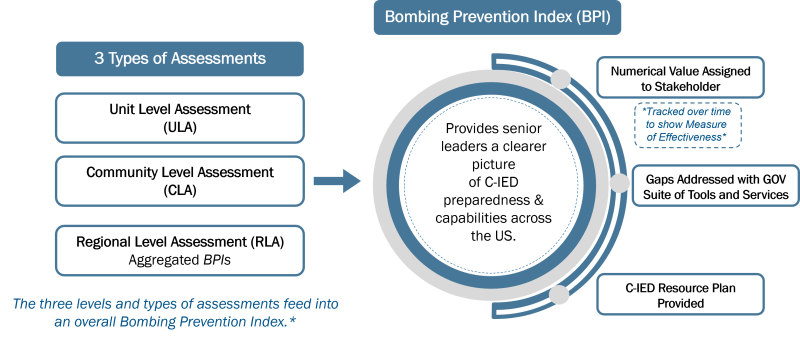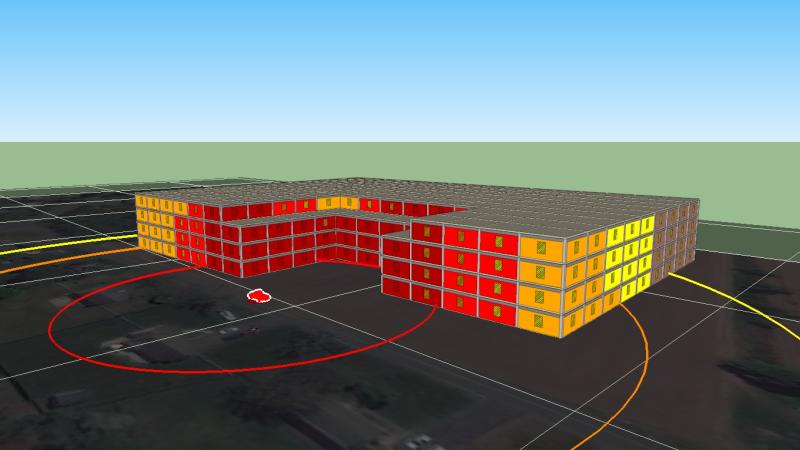Counter-Improvised Explosive Device (C-IED) Capability Assessments (CCA)
Description
The Counter-Improvised Explosive Device (C-IED) Capabilities Assessments (CCA) Program is a systematic program that evaluates and analyzes public safety agencies and entities in a methodological assessment process. The CCA Program determines the specific capabilities and activities to best address IED risks and resources gaps found during the assessment process. At its core, the CCA Program provides a complete picture of local and regional IED risks and sources identified gaps with the Office for Bombing Prevention's (OBP) preparedness resources.
The CCA Program provides two types of assessments:
- The Unit-Level Assessment (ULA)
- The Community-Level Assessment (CLA)

Unit-Level Assessments (ULA)
ULAs use a consistent and repeatable analytical methodology to assess and analyze the capabilities of:
- Bomb squads
- Explosives detection canine teams
- Dive teams
- Special Weapons and Tactics (SWAT) teams
ULA assessments measure the capability elements of personnel, equipment, and training required for effective prevention, protection, and response to Improvised Explosive Device (IED) threats. This integrated information provides a snapshot of unit, local, state, regional, and national Counter-IED (C-IED) preparedness that informs decision-makers on policy decisions, resource allocation for capability enhancement, and crisis management.
Description
Maintained by the Office for Bombing Prevention (OBP), ULA, housed with the National C-IED Capabilities Analysis Database (NCCAD), analyzes multiple levels of data—including geographic area, type of unit, and incident-specific resources—to determine unit, local, state, regional, and national C-IED response capabilities.
ULA provides readiness information to be used in planning for steady-state and crisis decision support during threats or incidents. This detailed level of data supports critical decision-making for federal, state, local, tribal, territorial, and private sector security partners that have a role in the C-IED mission.
OBP subject matter experts facilitate ULA with state, local, tribal, and territorial agencies with IED prevention and response units to:
- Determine current operational capabilities
- Identify specific personnel, planning, training, and equipment gaps
- Provide recommendations for capability enhancements
ULA reports assist operational decision-makers and resource providers in developing investment justifications that support state homeland security strategies and national priorities in accordance with DHS grant program guidance. The ULA capability data increases knowledge of C-IED capabilities at the unit, local, state, regional, and national levels in relation to relevant national preparedness goals.
Community-Level Assessments (CLA)
CLAs use a systematic process that identifies specific stakeholders in a given community and assesses their Counter-Improvised Explosive Device (C-IED) preparedness capabilities. This assessment assists with collectively identifying roles, responsibilities, and C-IED capability gaps within a community.
The Office for Bombing Prevention (OBP) works closely with communities to provide expertise on planning and operational requirements for IED incident preparedness in alignment with the National Preparedness Goal and Core Capabilities.
CLA Process
The process includes coordination with a Federal Sponsor, local point of contact and identified stakeholders from the jurisdictional area to conduct data collection activities. The outcomes of this process include the following:
- Identification of current gaps in C-IED capabilities
- Establishment of the jurisdictional Bombing Prevention Index (BPI)
- The BPI is a comprehensive analytical score based upon the responses provided during the data collection activities with the identified stakeholders
- Receipt of a comprehensive picture of jurisdictional vulnerabilities and C-IED capability gaps
- Improvement areas are addressed by a suite of C-IED resources provided by OBP and partnering Federal Agencies
The CLA identifies C-IED gaps and provides resources and recommendations that can assist the following jurisdictional entities in increasing their C-IED capabilities:
| Fire | HAZMAT | Law Enforcement | Emergency Management |
| Explosive Detection Canine | Dive Team | SWAT | Public Safety Bomb Squad |
| Fusion/Intelligence Center(s) | Public Information Office (PIO) | Health, Healthcare, and Emergency Medical Services | Private Sector Partners |
CLA Results
Following the completion of the Community Level Assessment the stakeholder is provided with their personalized C-IED Resource Plan. This plan delivers a comprehensive resource list of C-IED capability enhancements that addresses gaps or vulnerabilities identified within the jurisdictional area. The C-IED Resource Plan provides a recommended timeline to resource these gaps. These courses of action can provide the following:
- Aid in grant request justifications
- Provide a framework for resource allocation
- Assist communities with the development of an IED-specific response annex for their emergency operations plan
Contact
For more information on CCA Program or other Office for Bombing Prevention (OBP) programs, please reach out to OBP@cisa.dhs.gov.
To register your department, or to obtain access to the ULA system, send an email to our team at obpoperations@cisa.dhs.gov. To go to the NCCAD home page or to log in to the system go to https://nccad.dhs.gov.
For more information on CLAs, please send an e-mail to obpoperations@cisa.dhs.gov.
To report suspicious activity, call 9-1-1 or contact local law enforcement.





